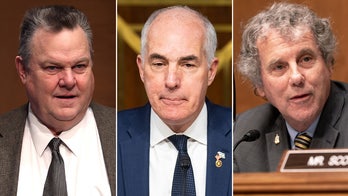
Secretary of State Hillary Clinton is raising alarms that the Pakistani government is losing control of its country and ceding ground to Taliban extremists, as she presses lawmakers to approve fresh funding for the region.
In back-to-back days of testimony on Capitol Hill, Clinton raised concern that government-backed law enforcement was losing the northwest region of the country.
"We have to try to strengthen civilian law enforcement" in those tribal areas, she told a House appropriations subcommittee Thursday, after calling the nuclear state a "mortal threat" to the security of the world a day before. "(The administration is) deeply concerned by the increasing insurgency that is destabilizing Pakistan."
Clinton had harsh words Wednesday for the country that is supposed to be the United States' key ally in the war against the Taliban and Al Qaeda in Afghanistan.
"I think that the Pakistani government is basically abdicating to the Taliban and to the extremists. But look at why this is happening," she told the House Foreign Affairs Committee. "If you talk to people in Pakistan, especially in the ungoverned territories, which are increasing in number, they don't believe the state has a judiciary system that works."
The comments came after Pakistani President Asif Ali Zardari approved Islamic Sharia law in the northwestern Swat valley, which has been overtaken by Taliban forces.
President Obama has invited Zardari and Afghan President Hamid Karzai to the White House in early May, and Clinton made clear that the U.S. government expects Zardari in particular to take a much harder line against extremists.
"It's corrupt, it doesn't extend its power into the countryside," she said of the Pakistani government. "So the government of Pakistan, however it is constituted, which is, of course, their business, not ours, must begin to deliver government services."
Clinton encountered skepticism Thursday from some committee members who expressed doubt about succeeding in Pakistan. Rep. David Obey, D-Wis., told her he worries that the administration's policy agenda -- domestic and foreign -- could be "devoured" by the Pakistan-Afghanistan problem.
"I have absolutely no confidence in the ability of the existing Pakistan government to do one blessed thing," Obey said.
Rep. Nita Lowey, D-N.Y., the committee chairwoman, expressed similar concerns.
"The escalating terrorist violence in Pakistan and that government's inability and unwillingness to confront the extremist threat undermine any progress we have made in Afghanistan and complicates future efforts there," Lowey said. "I fear that we are losing the window of international consensus and commitment to help the region gain a strong foothold on its long climb out of conflict."
Obey asked whether a year was a reasonable time for determining whether the Pakistani government was showing enough initiative and resolve to merit continued U.S. financial and political support. Clinton said she could not put a timetable on how long it might take to get results, but said the administration intends to provide Congress with benchmarks for measuring progress.
"We want to see progress on these measurements, and we want to see the progress beginning and continuing, and not stopping and starting," she said.
One measure of progress in Pakistan, Clinton said, is the extent to which the Pakistani military is shifting its troops from the Indian border to the Afghan border, where the Taliban threat has been expanding.
Clinton was appearing before the appropriations panel that is reviewing the administration's request for $7.1 billion in additional funds for the State Department this budget year. Of that total, $497 million would be for State Department support of Pakistan and $980 million would be for Afghanistan. About $482 million would be for Iraq.
Clinton said that local job creation is a key purpose of the extra funds requested for State Department work in Afghanistan.
She told the panel that a main goal is to improve security at the local level in Afghanistan by putting more people to work. And she said the administration believes that many in the Taliban insurgency who are fighting against U.S. and Afghan forces are motivated more by money than ideology.
Clinton defended President Barack Obama's effort to engage diplomatically with Iran, calling it a reasonable alternative to what she called a failed Bush administration policy.
"We tried the policy of total isolation for eight years," she said in a rising voice, "and it did not deter Iran one bit. The nuclear program has continued unabated. They weren't supporting Hamas before. They are supporting Hamas now."
Clinton said it remains unclear whether international pressure on Iran will compel it to change course.
"Sanctions are a tool for us to leverage pressure on the Iranian regime to change behavior that we obviously consider serious threats," she said. "And so we are talking with our partners about additional sanctions as part of an incentives-disincentives approach to Iran. It's a difficult balancing act."
The Associated Press contributed to this report.




